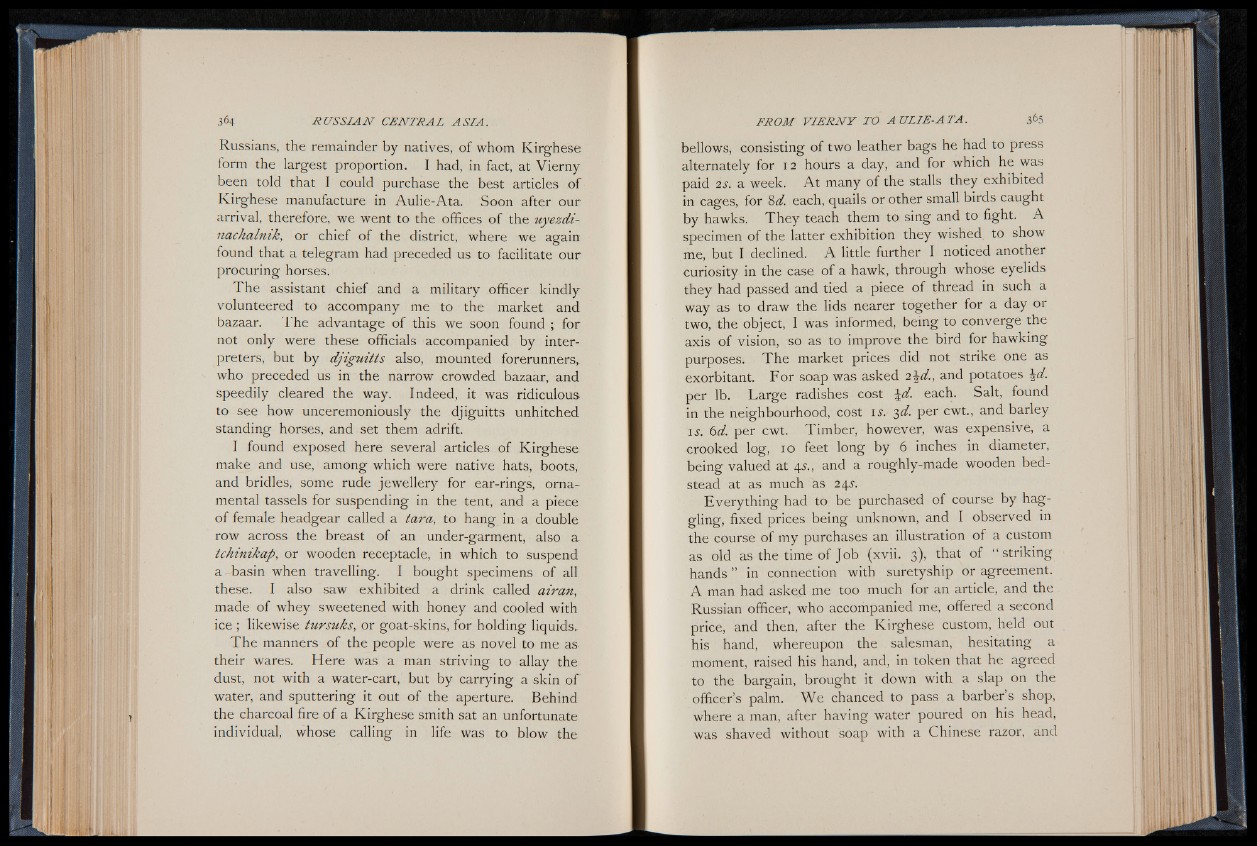
Russians, the remainder by natives, of whom Kirghese
form the largest proportion. I had, in fact, at Vierny
been told that I could purchase the best articles of
Kirghese manufacture in Aulie-Ata. Soon after our
arrival, therefore, we went to the offices of the uyezdi-
nachalnik, or chief of the district, where we again
found that a telegram had preceded us to facilitate our
procuring horses.
The assistant chief and a military officer kindly
volunteered to accompany me to the market and
bazaar. The advantage of this we soon found ; for
not only were these officials accompanied by interpreters,
but by djiguitts also, mounted forerunners,
who preceded us in the narrow crowded bazaar, and
speedily cleared the way. Indeed, it was ridiculous
to see how unceremoniously the djiguitts unhitched
standing horses, and set them adrift.
I found exposed here several articles of Kirghese
make and use, among which were native hats, boots,
and bridles, some rude jewellery for ear-rings, ornamental
tassels for suspending in the tent, and a piece
of female headgear called a tara, to hang in a double
row across the breast of an under-garment, also a
tchinikap, or wooden receptacle, in which to suspend
a basin when travelling. I bought specimens of all
these. I also saw exhibited a drink called airan,
made of whey sweetened with honey and cooled with
ice ; likewise tursuks, or goat-skins, for holding liquids..
The manners of the people were as novel to me as
their wares. Here was a man striving to allay the
dust, not with a water-cart, but by carrying a skin o f
water, and sputtering it out of the aperture. Behind
the charcoal fire of a Kirghese smith sat an unfortunate
individual, whose calling in life was to blow the
bellows, consisting of two leather bags he had to press
alternately for 12 hours a day, and for which he was
paid 23. a week. A t many of the stalls they exhibited
in cages, for 8d. each, quails or other small birds caught
by hawks. They teach them to sing and to fight. A
specimen of the latter exhibition they wished, to show
me, but I declined. A little further I noticed another
curiosity in the case of a hawk, through whose eyelids
they had passed and tied a piece of thread in such a
way as to draw the lids nearer together for a day or
two, the object, I was informed, being to converge the
axis of vision, so as to improve the bird for hawking
purposes. The market prices did not strike one as
exorbitant. For soap was asked 2 \d., and potatoes \d.
per lb. Large radishes cost \d. each. Salt, found
in the neighbourhood, cost 13. 3d. per cwt., and barley
13 . 6d. per cwt. Timber, however, was expensive, a
crooked log, 10 feet long by 6 inches in diameter,
being valued at 43., and a roughly-made wooden bedstead
at as much as 243.
Everything had to be purchased of course by haggling,
fixed prices being unknown, and I observed in
the course of my purchases an illustration of a custom
as old as the time of Job (xvii. 3), that of “ striking
hands ” in connection with suretyship or agreement.
A man had asked me too much for an article, and the
Russian officer, who accompanied me, offered a second
price, and then, after the Kirghese custom, held out
his hand, whereupon the salesman, hesitating a
moment, raised his hand, and, in token that he agreed
to the bargain, brought it down with a slap on the
officer’s palm. We chanced to pass a barbers shop,
where a man, after having water poured on his head,
was shaved without soap with a Chinese razor, and